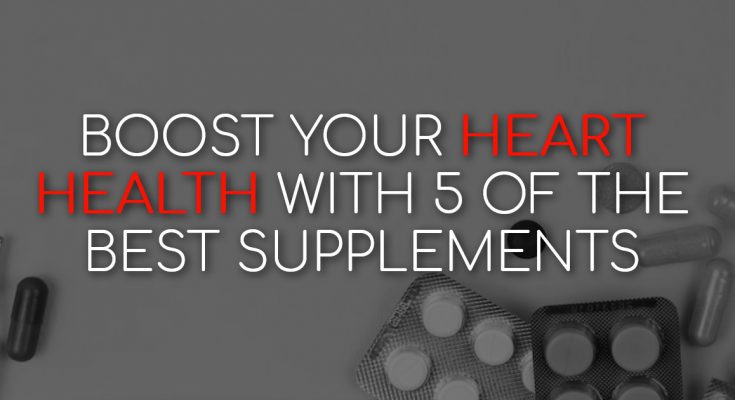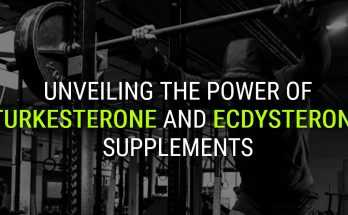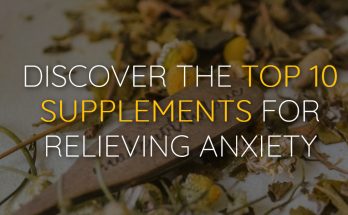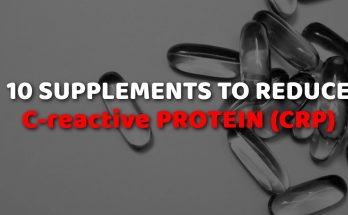When it comes to taking care of our hearts, a balanced diet and regular exercise are vital.
But have you considered the potential benefits of supplements in maintaining a healthy heart?
In this article, we delve into five of what we believe to be the best supplements for supporting cardiovascular health.
1. Coenzyme Q10
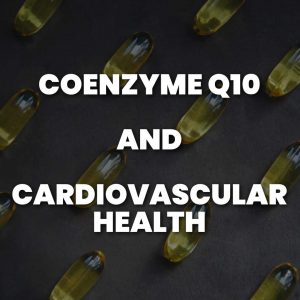
Coenzyme Q10, also known as CoQ10, is a naturally occurring compound found in nearly every cell of our bodies.
CoQ10 plays a vital role in the production of cellular energy, acting as a key player in the electron transport chain within the mitochondria.
This energy production process is crucial for the optimal functioning of our cells, including those in the heart.
One of Coenzyme Q10’s most prominent roles in heart health lie’s in its ability to act as a potent antioxidant and anti-inflammatory agent.
By neutralizing harmful free radicals that can damage our cells, including those found in the heart, CoQ10 helps protect cardiac cells from oxidative stress and inflammation, minimizing the risk of cardiovascular diseases.
Coenzyme Q10 deficiency and lowered blood levels of CoQ10 have been linked to the progression of cardiovascular and other diseases such as those of the gum.
In particular, clinical research has confirmed that Coenzyme Q10 can be a useful adjunctive therapy for patients with heart failure.
Some of the latest scientific research on Coenzyme Q10 and cardiovascular diseases concludes:
CoQ10 supplementation in patients with heart failure (HF) improved functional capacity, increased serum CoQ10 concentrations, and led to fewer major adverse cardiovascular events.
CoQ10 had positive quantifiable effects on inflammatory markers in patients with ischemic heart disease.
Myocardial hemodynamics improved in patients who received CoQ10 supplementation before cardiac surgery. Effects on HTN were inconclusive.
In predominantly older adult males with cardiovascular disease (CVD) or hypertension (HTN), CoQ10 supplementation added to conventional therapy is safe and offers benefits clinically and at the cellular level. – [1]
Evidence suggests that the CoQ10 supplement may be a useful tool for managing patients with heart failure. – [2]
The overall results demonstrated that supplementation with CoQ10 shows an enhanced potential to lower CVD risk in diabetic patients by reducing total cholesterol and LDL.
Moreover, the beneficial effects of CoQ10 in lowering the CVD risk are associated with its ameliorative properties against oxidative stress and improving endothelial health. – [3]
Recommended Product: Pharma Nord Bio-Ubiquinol Active QH 100mg 150 Capsules
2. Omega-3 Fatty Acids
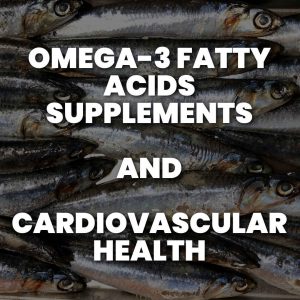
Omega-3 fatty acid supplements such as fish oil have garnered immense attention in recent years for their potential cardiovascular health benefits.
Omega-3 fatty acids may reduce the risk of heart diseases by reducing inflammation, lowering blood lipids, preventing blood blots and its anti-arrhythmic properties.
There are many different omega-3 fatty acid supplements on the market from fish oils to cod liver oil to krill oil to micro-algae DHA rich oils, the latter which is a vegan option for increasing long-chain omega-3 intake.
Moderate‐ and low‐certainty evidence suggests that increasing LCn3 slightly reduces risk of coronary heart disease mortality and events, and reduces serum triglycerides (evidence mainly from supplement trials).
Increasing ALA slightly reduces risk of cardiovascular events and arrhythmia. – [4]
Omega-3 FA supplementation had a positive effect in reducing the incidence of major adverse cardiovascular events (MACE), cardiovascular death, myocardial infarction (MI).
Regardless of the stage of CHD, omega-3 FA supplementation can prevent the occurrence of MI.
The 0.8–1.2 g omega-3 FA supplementation alleviated CHD risk more effectively than lower or higher doses. – [5]
Marine omega‐3 supplementation lowers risk for myocardial infarction, CHD death, total CHD, CVD death, and total CVD, even after exclusion of REDUCE‐IT.
Risk reductions appeared to be linearly related to marine omega‐3 dose. – [6]
Recommended Product: Moller’s ® | Omega-3 | Nordic Fish Oil Capsules
Recommended Vegan Omega-3 Supplement: Vegan Omega-3 DHA Algae Oil Capsules
3. Garlic Extract
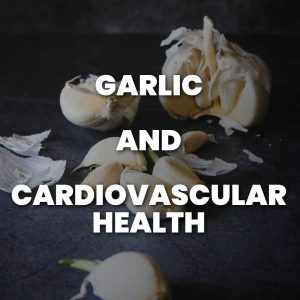
While garlic has been used for centuries as a culinary ingredient, its benefits extend far beyond adding flavor to your favorite dishes.
Recent studies have revealed a powerful connection between garlic supplements and heart health, turning this humble vegetable into a potent weapon against cardiovascular diseases.
Research has found that both garlic and aged garlic extract supplements can support heart-health by addressing numerous common cardiovascular disease risk factors.
From lowering cholesterol levels, to reducing blood pressure and preventing blood clots, garlic possesses a myriad of mechanisms to support optimal cardiovascular function.
The latest summary of the scientific literature on garlic supplements and cardiovascular health concludes:
We conclude that garlic supplementation has the potential for cardiovascular protection based on risk factor reduction (hypertension and total cholesterol) and surrogate markers (CRP, PWV, and CAC) of atherosclerosis. – [7]
The included studies showed that the use of garlic can reduce blood pressure, waist circumference, body mass index, LDL-c, non-HDL-c, total cholesterol, triglycerides, and inflammatory markers.
It also can increase the levels of HDL-c and can improve cardiovascular parameters such as coronary artery calcium, microcirculation, epicardial and periaortic adipose tissue, post occlusive reactive hyperemia, low attenuation plaque, carotid intima-media thickness; and carotid intima-media thickness.
Due to these reasons, garlic can be considered in the prevention and treatment of CVD risk factors. – [8]
Recommended Product: Organic Black Garlic Extract (Fermented) – 60 x 320mg Capsules – Clinically Proven Brand ABG+
4. Cocoa Flavanol Supplements
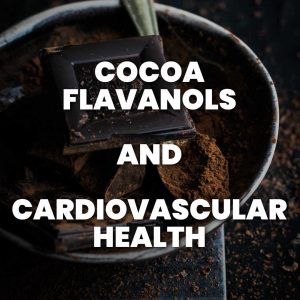
Cocoa flavanols have emerged as a promising and tasty way to support cardiovascular health.
Recent research suggests that the consumption of cocoa flavanols may help lower blood pressure, reduce inflammation, enhance blood vessel function, and improve cholesterol levels.
One of the most significant benefits of flavanol-rich cocoa and dark chocolate lies in its ability to improve endothelial function.
Cocoa flavanols help maintain endothelium-dependent vasodilation, which contributes to normal blood flow.
In order to obtain the claimed effect, 200 mg of cocoa flavanols should be consumed daily.
This amount could be provided by 2.5 g of high-flavanol cocoa powder or 10 g of high-flavanol dark chocolate, both of which can be consumed in the context of a balanced diet. – [9]
Cocoa extract supplementation did not significantly reduce total cardiovascular events among older adults but reduced CVD death by 27%.
Potential reductions in total cardiovascular events were supported in per-protocol analyses. – [10]
Recommended Product: Aduna Super Cacao High Flavanol Powder
Recommended Product #2: Blood Flow+ CocoActiv, High Strength Cocoa Flavanol Extract
5. Magnesium Supplements
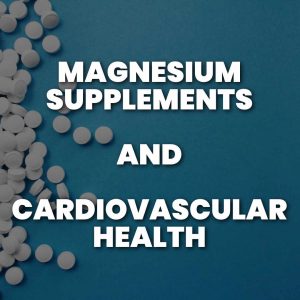
Magnesium supplements can be a life-saving and cost-effective supplement in the fight against heart disease.
This vital mineral is involved in over 300 biochemical reactions in our bodies, including those related to heart health.
Magnesium acts as a natural calcium-channel blocker, helping to maintain healthy blood pressure levels by relaxing and dilating the blood vessels.
Hypertension is still considered one of the leading addressable cardiovascular disease risk factors.
Magnesium supplementation may improve endothelial function without affecting carotid intima media thickness. – [11]
Mg deficiency is common in CVD, and Mg supplementation has shown antioxidant and anti-inflammatory properties in patients with and without Mg deficiency.
Mg supplementation is well tolerated with few side effects. Therefore, it may represent a reasonable additional therapy for many CVDs. – [12]
The results of this meta-analysis study suggest that magnesium sulfate can be used safely and effectively and is a cost-effective way in the prevention of many of ventricular and supraventricular arrhythmias. – [13]
Recommended Product: Nutri Advanced Magnesium Glycinate 100mg
References
[1] Coenzyme Q10 as Adjunctive Therapy for Cardiovascular Disease and Hypertension: A Systematic Review
[2] Coenzyme Q10 in the treatment of heart failure: A systematic review of systematic reviews
[4] Omega‐3 fatty acids for the primary and secondary prevention of cardiovascular disease
[8] Garlic: A systematic review of the effects on cardiovascular diseases
[12] Magnesium, Oxidative Stress, Inflammation, and Cardiovascular Disease
The information in this article has not been evaluated by the FDA and should not be used to diagnose, cure or treat any disease, implied or otherwise.
Always consult with a qualified healthcare professional before making any significant dietary or lifestyle changes including supplements and herbs.
